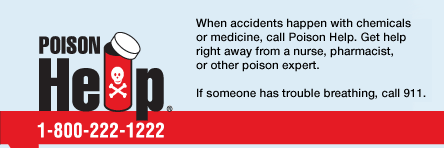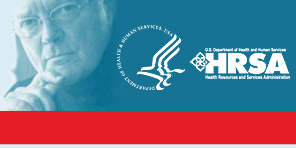
Camera Ready Brochure (PDF, 6.9 MB)
Visit the Adobe Reader Web site and follow the instructions to download the appropriate version of Adobe Reader for your operating system.
Why should I worry about poisoning?
Every day we use medicines, chemicals, and other
products at home and work. Many of these products can be
poisons. A poison is anything that can harm you
if it is
• used in the wrong way
• used by the wrong person
• used in the wrong amount
Often poisons harm you when you don't expect it. When a
poison harms someone, that's called poisoning. Most poisonings
happen when poisons
• are swallowed
• come in contact with the skin
• are splashed in the eyes
• are breathed in or inhaled
Poisoning is a leading public health problem. It does not just
happen to children. It can happen to anyone, at any time and in any
place. Poisoning is much more common than most people think.
Poison Help is a free phone service connecting callers
to their local poison centers. When accidents happen with
chemicals or medicine, call Poison Help (1-800-222-1222).
Get help right away from a nurse, pharmacist, or other poison expert.
If someone has trouble breathing, call 911 or your local emergency
ambulance number right away.
POISON HELP
1-800-222-1222
Photo of Woman on the telephone
When accidents happen with chemicals or medicine, call Poison Help. Get help right away from a nurse, pharmacist, or other poison expert.
Visit Poison Help online at:
PoisonHelp.hrsa.gov
POISON
HELP
1-800-222-1222
PoisonHelp.hrsa.gov
Roll-Folded
Outside
1. Back Cover 2. Front Cover
Specs:
Description: 6-panel, roll-folded brochure with 3.5" pocket on inside back panel, and 1/2" glue ear on pocket. Folded Size:8.5"x5.5"
Inks: 4-Color Process
Notes: See keyline (does not print) and folding instructions and pocket shape.
3.5" Pocket Score & Fold .5" Glue Ear (score & fold)
More Information
For Poison Help materials,
visit PoisonHelp.hrsa.gov.
Brochure_Trim_Press.qxd 1/8/08 2:14 PM Page 1
Brochure_Trim_Press.qxd 1/8/08 2:14 PM Page 2
Keep the Poison Help number, 1-800-222-1222, near your phone. Or enter it into speed dial so that it is quickly available.
Photo of an older adult woman
Photo of a Woman and a baby
If you think someone has
been poisoned, Remember:
1. Help is as near as your phone. Keeping calm will help you understand the
advice and help the victim.
2. Check the condition of the victim. CALL 911 RIGHT AWAY IF the person
• has collapsed (is unconscious)
• is having trouble breathing
• has severe pain in the chest
• shows other life-threatening signs
3. Call Poison Help (1-800-222-1222) even if there are no signs of poisoning.
Try to identify what poison is involved. If it is a product, bring its container
to the phone.
4. A nurse, pharmacist, or other poison expert will answer your call to Poison Help.
Be ready to tell the person
• the name of the product
• the amount of product involved
• the age and weight of the victim
• what signs of poisoning you notice
5. A poison expert will decide if the person is in danger. The poison expert will give
you the advice you need. The poison center may stay on the phone with you
while you get help, or call you later to follow up.
6. Most calls can be handled at home. If you need a doctor or ambulance, the
poison expert will tell you right away.
Photo of a Baby
Photo of a woman and two young children
Some Common Poisoning Risks
• cleaning products
• vitamins and food supplements, like minerals and herbs
• medicines
• cigarettes and cigarette butts
• beauty products, perfumes, and nail polish removers
• carbon monoxide gas (CO) (usually from cars and heating devices)
• insect sprays, weed killers, and plant food
• car care products (such as antifreeze, wiper fluid, and motor oil)
• alcohol or drugs of abuse (such as pain killers and cocaine)
• plants in the house and yard
• animal bites and stings
Tips to Prevent Poisonings
• Buy products that children can't open easily. Be aware that child-resistant caps are
not risk free. Once a child learns how to open containers with these caps, they will
not keep a child safe. A child will only take longer to open them.
• Keep medicines, cleaners, and other poisons out of sight. Keep them in cabinets
that are locked or in cabinets that children can't open.
• Be careful when using medicines, cleaners, and other poisons. Don't leave them
open when you answer the phone or doorbell. Replace the cap. Take the product
with you. Poisonings can happen in just a few seconds.
• Always keep products in the containers they came in.
• Install carbon monoxide (CO) alarms in your home.
• Never take medicine in the dark.
• Be careful when taking more than one medicine. Read the labels to avoid an overdose.
When taking more than one medicine at a time, make sure it's safe to take them
together. If you have a question about medicines, call Poison Help (1-800-222-1222).
Roll-Folded
Inside
1. Glue Ear
2. Pocket
3. Back Cover4. Front CoverSpecs:
Description: 6-panel, roll-folded brochure
with 3.5" pocket on inside back panel,
and 1/2" glue ear on pocket.
Folded Size: 8.5"x5.5"
Inks: 4-Color Process
Notes: See keyline (does not print) and
folding instructions and pocket shape.
3.5" Pocket
Score & Fold
.5" Glue Ear (score & fold)
|



